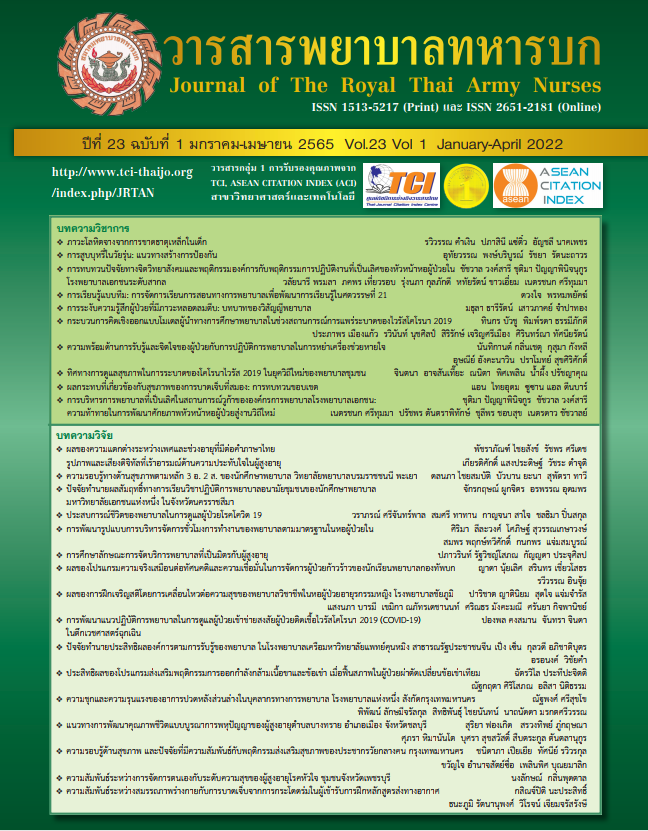The Effects of An Educative Supportive Program on The Nutrition Self-Care Behavior and Nutritional Status among Colorectal Cancer Patients Receiving Chemotherapy
Keywords:
the education and support, self-care behavior, nutritional status, colorectal cancer patientsAbstract
The purpose of this quasi-experimental research was to study the effect of an educative supportive program based on the Orem theory on the nutrition self-care behavior and nutritional status among colorectal cancer patients receiving chemotherapy. The samples consisted of 60colorectal cancer patients receiving chemotherapy and were recruited based on an inclusion criteria including a control group and an experimental group. Data collection tools included 1) Personal demographic questionnaire 2) Self-care behavior assessment for cancer patients receiving chemotherapy (the result of test-retest = .97) and 3) Nutrition assessment (Cronbach’s alpha coefficient = .98). Data were analyzed using descriptive statistics, chi-squared test, Friedman test, the Mann-Whitney U test and the Wilcoxon signed rank test.
The findings indicated that after participating in the educative and supportive program, the nutrition self-care behavior mean score of the experimental group had statistically higher mean score of nutrition self-care behavior than that of the control group (p<.001), with their score peaking on the fourteenth and twenty-eight day. However, the nutritional status, hemoglobin, and hematocrit were of the two group not statistically significant different.
Downloads
References
Internatinal Agency for Research on Cancer. Global Cancer Statistics 2018: GLOBOCAN Estimates of Incidence and Mortality Worldwide for 36 Cancers in 185 Countries. Global Cancer Statistics 2018; 0: 3-31.
Maikaiw C, Tamdee D. The effects of clinical Nursing practice Guideline to prevent Oral Mucositis Among Cancer Patients Received Chemotherapy. Nursing Journal. 2010; 37(1): 86-95. (in Thai)
Ob-oun T, Kopol J, Phosahut P, Thirasirawate S, Chisong C, Phumart P, Seesin T. Adverse Drug Reaction Monitoring and Counseling In Oncologic Patients At Mahasarakham Hospital. The 4th Annual Northeast Pharmacy Research Conference of 2012; 2012 Feb 11-15; Khon kaen, Thailand. p. 126-134. (in Thai)
Panya P, Saneha C, Puwarawuttipanit W, Soparattanapaisarn N. Factors Influencing on Nutritional Status in Patients with Colorectal Cancer Receiving Chemotherapy. Journal of Nursing Science. 2017; 34(1): 66-76. (in Thai)
Atta A, Malka D, Sabate J, Bonnetain F, Lecomte T, Aparicio T. Malnutrition is high and underestimated during Chemotherapy in gastrointestinal cancer: an AGEO propective cross-sectional multicenter study. Nutrition and Cancer. 2012; 64(4): 535-542.
Lertpanich P, Namvongprom A, Pakdevong N. Symptom Experiences and Quality of Life of Patients with Advanced Cancer Receiving Chemotherapy. APHEIT INTERNATIONAL JOURNAL. 2017; 6(1): 45-55. (in Thai)
Veerahpong N. The role of nurse for promoting nutrition in cancer patients. Thai Red Cross Nursing Journal. 2015; 8(1): 34-42. (in Thai)
Supakornpas N, Chivasakunyong, Buranaphir S. The effect of nutrition care in patients with advanced stages or matastasis stage receiving chemotherapy. Journal of the Medical Association of Thailand. 2016; 99(12): 1283- 1290. (in Thai)
Pimbung N, Wattana C, Harnirattisai T. The Effects of a Symptom-management Program on Severity of Symptom and Nutritional Status among Colorectal Cancer Patients Receiving Chemotherapy. Nursing Journal. 2015; 42: 73-83. (in Thai)
Baoraksa C, Chanthawong S. Assessment of Knowledge in Cancer Patients Undergoing Chemotherapy at Udon Thani Hospital. Srinagarind Medical Journal. 2018; 33(5): 495-500. (in Thai)
Poonsamer O, Wirojratana V, Jitramontree N, Thosingha O. The Relationships Between Knowledge of Chemotherapy Treatment, Skills of Self-Care, Social Support and Well-Being During Transition Among Older Patients with Cancer Receiving Chemotherapy. Journal of The Royal Thai Army Nurses. 2014; 15(2): 368-377. (in Thai)
U-raipunt Y. Factors Associated with Self - Health Care Behaviors of Cancer Patients Received Chemotherapy at Phramongkutklao Hospital. Journal of The Royal Thai Army Nurses. 2014; 15(1): 87-92. (in Thai)
Wai Chi Mak, Ching SY. Effect of an education program on knowledge, self-care behavior and handwashing competence on prevention of febrile neutropenia among breast cancer patients receiving Doxorubicin and Cyclophosphamide in Chemotherapy Day Centre. Asia-Pacific Journal of Oncology Nursing. 2015; 2(4): 278-88.
Lonil A, Srimoragot P, Suradom S. Nursing Case Management to Develop Self Care Agency in Colorectal Cancer Patients. Journal of Nursing Science. 2011; 27(2): 59-76. (in Thai)
Orem. Nursing: Concepts of practice 6th editor. St. Louis Mosby; 2001.
Kannuch J, Namvongprom A, Pakdevong N. Self-Care Ability, Quality of Life, and GI Symptoms Management after the Self-Care Program of Patients with Chemotherapy. Journal of Nurse’ association of Thailand, North-Eastern Division. 2013; 31(1): 62-71. (in Thai)
Nantakaew K. Effects of an educative-supportive program on self-care and quality of life among lung cancer patients receiving chemotherapy. [ dissertation]. Chiang Mai: Chiang Mai University; 2010. (in Thai)
Downloads
Published
How to Cite
Issue
Section
License
Copyright (c) 2022 Journal of The Royal Thai Army Nurses

This work is licensed under a Creative Commons Attribution-NonCommercial-NoDerivatives 4.0 International License.
บทความหรือข้อคิดเห็นใดใดที่ปรากฏในวารสารพยาบาลทหารบกเป็นวรรณกรรมของผู้เขียน ซึ่งบรรณาธิการหรือสมาคมพยาบาลทหารบก ไม่จำเป็นต้องเห็นด้วย
บทความที่ได้รับการตีพิมพ์เป็นลิขสิทธิ์ของวารสารพยาบาลทหารบก
The ideas and opinions expressed in the Journal of The Royal Thai Army Nurses are those of the authors and not necessarily those
of the editor or Royal Thai Army Nurses Association.






